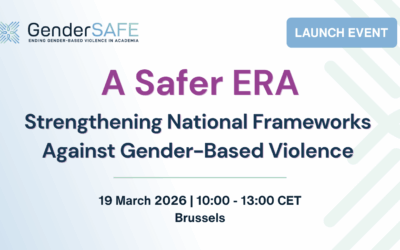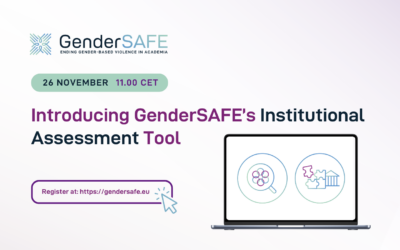Next to its Report on zero-tolerance policies, GenderSAFE has issued a second deliverable providing an assessment of specific needs to be addressed in institutional policies on gender-based violence, regarding intersectionality, precarity and mobility. In this analysis, needs are understood as the essential requirements and resources necessary to support victims/survivors effectively.
The UniSAFE survey has revealed that gender-based violence disproportionately affects non-binary, trans, and LGBQ+ students and staff, as well as those from ethnic minorities, with disabilities or chronic illnesses, working in precarious conditions, participating in mobility schemes, or conducting research at remote sites (Lipinsky et al. (2022); Humbert et al. (2022)).
Why are these students and staff more affected than others?
How do institutions currently respond to the needs of groups at increased risk of gender-based violence?
What requirements and resources would be necessary for institutions to effectively address gender-based violence affecting these groups?
GenderSAFE presents the results of a needs assessment related to the experiences of gender-based violence among groups at increased risk, with a particular focus on intersectionality, mobility and precarity. It specifically targeted women and researchers facing multiple intersectional inequalities; people from various disciplines working in remote research sites, on mobility schemes or on field trips; and doctoral and postdoctoral fellows employed in precarious positions. This needs assessment followed two objectives:
- Fill a knowledge gap by generating new insight into the experiences of specific at-risk groups with the institutional response to their experience of gender-based violence, focusing on intersectionality, mobility and precarity.
- Contribute the operationalisation of the Model Policy Framework developed in the project, to be tested with the GenderSAFE Community of Practice with a view to making this Model Policy Framework reflective of the needs of these target groups, and thus more inclusive and sensitive to intersectional inequalities.
A literature review of the needs and risks facing the defined at-risk groups
This needs assessment was preceded by a literature review that identified various forms of discrimination and violence to which the defined target groups are exposed. The findings underscore specific needs of such at-risk groups to be covered by mechanisms and policies, such as tailored support mechanisms for various at-risk groups, inclusive policies, and proactive measures: dedicated officers, accessible reporting systems and explicit inclusion of intersectional aspects in the institutional policies to address gender-based violence and promote safer environments for all individuals.
An analysis of institutional responses to experiences of gender-based violence
The needs assessment focused on the institutional response to experience of gender-based violence in terms of institutional policies, practices, processes, and procedures related to reporting, investigation and case handling, protective measures and sanctioning. The objective was to also capture situations where institutional policies are lacking or where institutional gender-based violence or other policies are in place but fall short of adequately serving the defined at-risk groups.
A total of 29 interviews was conducted with researchers and non-academic staff across Europe between April and June 2024.
The experiences reported in the interviews underscore various and multiple shortcomings in policies and the institutional responses to reported cases. The analysis presented in this report focuses on the following topics, selected as particularly salient for further work in the project:
- The institutional response to experiences of gender-based violence;
- Power, hierarchies and different forms of marginalisation;
- Awareness;
- Services;
Overall, the needs assessment report highlights the lack of effective and inclusive institutional policies, inadequate awareness and communication about available policies and support mechanisms, and challenges in reporting, investigating and sanctioning incidents of gender-based violence. The findings also emphasise the compounded vulnerabilities of individuals who belong to multiple marginalised groups, who often face unique challenges that are not adequately addressed by existing policies.
The implications of these findings are discussed to further the concept of a zero-tolerance approach to gender-based violence, as well as for the Model Policy Framework under development in GenderSAFE, before ending with brief conclusions.
Read the full report and analysis, available for all on Zenodo!
Please cite as: Michlová, M., Oliva, E., Fikejzová,, M., & Linkova, M. (2024). D2.2 GenderSAFE – Needs Assessment Report Addressing Intersectionality, Precarity and Mobility. Zenodo. https://doi.org/10.5281/zenodo.13380368



